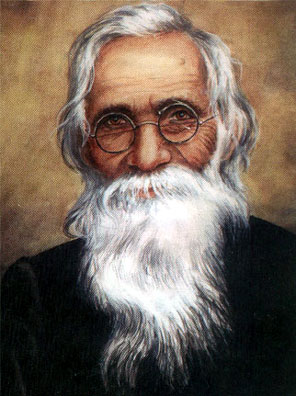
Entitle: Kavi Shiromani
Lekhnath Paudyal
Lekhnath Paudyal (लेखनाथ पौड्याल) is regarded as the founding father of modern Nepali poetry literature. He used to write the classic style of Nepali poetry. His poems possess a formal dignity that had been lacking in most earlier works in Nepali. Many of his compositions reflect the philosophy of orthodox Vedanta, whereas others are essentially original in their tone and inspiration. His poems are very much popular.
Quick Information
| Date of Birth: | 1941 B.S. (1885 A.D.) |
| Date of Departure: | 2022 B.S. (1966 A.D.) |
| Birth Location: | Arghaun Archale, Kaski, Nepal |
| Father’s Name: | Durgadutta Paudyal |
| Mother’s Name: | Vasundhara Devi Paudyal |
| Popular Compositions: | Pinjadako Suga, Ritu Vichara, Buddhi Vinoda, Satya-Kali-Samvada, Satya Smriti |
| Awards: | Kavi Shiromani |
| Occupation: | Poet, Short-story writer, Playwright, Essayist |


Lekhnath Paudyal was born on 15th Poush 1941 B.S. in Arghaun-Archale which is currently located in the Western Part of Nepal. He was born in a Brahmin family. From an early age, he composed pedantic (riddle-solving) verses, a popular genre adapted from an earlier Sanskrit tradition. His poems had first published in 1904 A.D. His name “Lekhnath” can be translated as “the god of writing”.
Education
He received his first lessons from his father. Around the turn of the century, he was sent to Kathmandu to attend a Sanskrit school and thence to the holy city of Banaras, as was customary, to continue his higher education to learn the classics of Sanskrit literature, from which he drew great inspiration.
Contributions
In all of his compositions, his primary concern was to create sweetness in the language of his poems. His devotional poems are more formal and are admired for their beauty and for the sincerity of the emotions they express. “Saraswati Smriti” is the prime illustration of this feature of Lekhnath's poetry. His first composition after 1950 was a long poem entitled “Amar Jyotiko Satya Smriti”, which expressed grief over the death of Mahatma Gandhi.
Lekhnath did not develop the great promise of these early episodic poems further until much later in his life, but a large number of his shorter poems continued to appear in a variety of literary journals in both Nepal and India. Many poems were probably never published and may now be lost. A two-volume collection, Delicacy (Lalitya) was published in 1967–1968 and contained one hundred poems. Lekhnath's shorter works covered a wide variety of topics and conveyed all of the nine rasa. Although many are plainly moralistic, some have a whimsical charm and are often couched in uncharacteristically simple language.
Notable Awards
In 1951, Lekhnath was invested by King Tribhuvan with the title of “Kavi Shiromani”, which literally means “Crest-Jewel Poet” but is generally translated as “Poet Laureate”. Since his death in 1966, no other poet has been similarly honored, so the title would seem to be his in perpetuity.
He was also honored by the Nepali literary world on his 17th birthday (in 1995) when he became the focal point of a procession around the streets of Kathmandu. He was seated in a ceremonial carriage and paraded through the city, pulled by most of the well-known poets of the time, and even by the prime minister (of that time) Matrika Prasad Koirala.
In 1969, he was awarded membership in the newly founded Royal Nepal Academy, and in 1969 (after his death), he was honored posthumously with the prestigious Tribhuvan Puraskar prize.
Born into a tradition of conservative and priestly scholasticism, Lekhnath Paudyal was innovative enough to compose poems in his mother tongue that dared to make occasional references to contemporary social realities, and he also brought the discipline and refinement of ancient Sanskrit conventions to the development of Nepali poetry.
NOTES:
All dates except date of birth (and those which are immediately followed by B.S.), are in A.D.
No comments:
Post a Comment